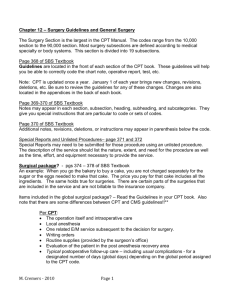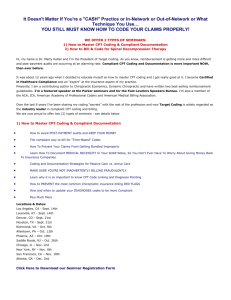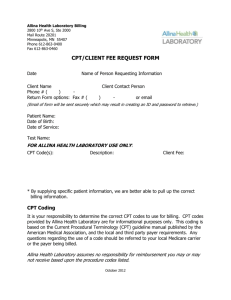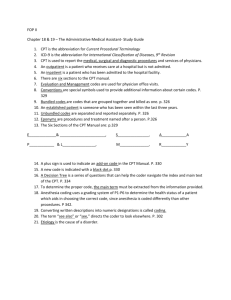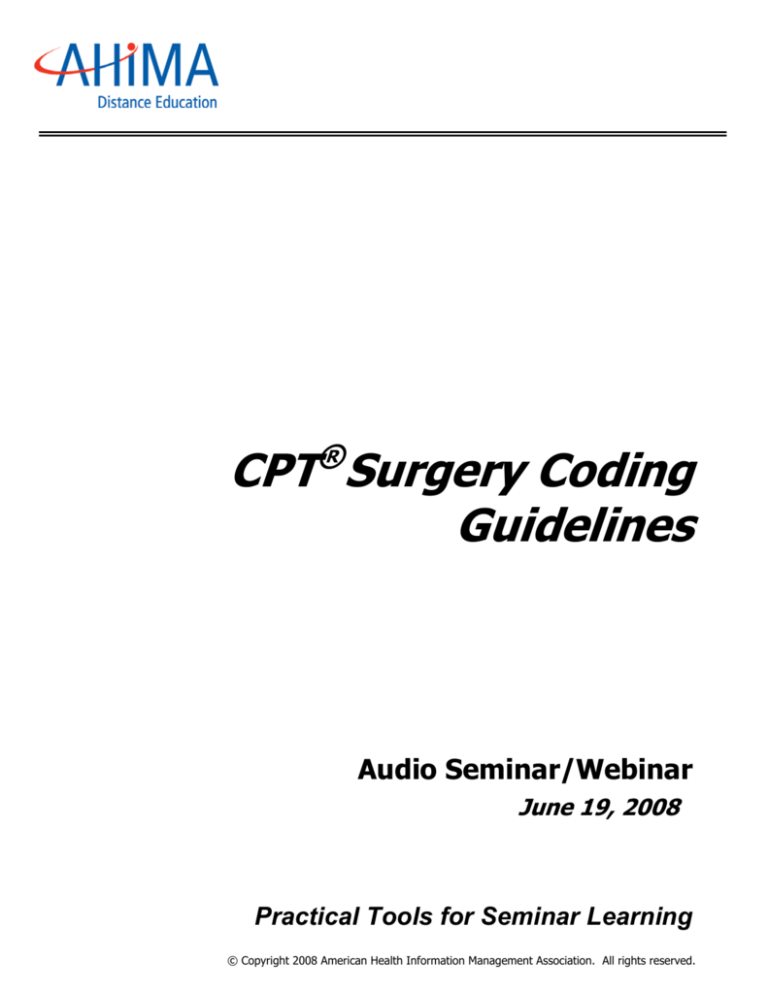
®
CPT Surgery Coding
Guidelines
Audio Seminar/Webinar
June 19, 2008
Practical Tools for Seminar Learning
© Copyright 2008 American Health Information Management Association. All rights reserved.
Disclaimer
The American Health Information Management Association makes no
representation or guarantee with respect to the contents herein and
specifically disclaims any implied guarantee of suitability for any specific
purpose. AHIMA has no liability or responsibility to any person or entity
with respect to any loss or damage caused by the use of this audio
seminar, including but not limited to any loss of revenue, interruption of
service, loss of business, or indirect damages resulting from the use of this
program. AHIMA makes no guarantee that the use of this program will
prevent differences of opinion or disputes with Medicare or other third
party payers as to the amount that will be paid to providers of service.
CPT® five digit codes, nomenclature, and other data are copyright 2007
American Medical Association. All Rights Reserved. No fee schedules,
basic units, relative values or related listings are included in CPT. The AMA
assumes no liability for the data contained herein.
As a provider of continuing education the American Health Information
Management Association (AHIMA) must assure balance, independence,
objectivity and scientific rigor in all of its endeavors. AHIMA is solely
responsible for control of program objectives and content and the selection
of presenters. All speakers and planning committee members are expected
to disclose to the audience: (1) any significant financial interest or other
relationships with the manufacturer(s) or provider(s) of any commercial
product(s) or services(s) discussed in an educational presentation; (2) any
significant financial interest or other relationship with any companies
providing commercial support for the activity; and (3) if the presentation
will include discussion of investigational or unlabeled uses of a product.
The intent of this requirement is not to prevent a speaker with commercial
affiliations from presenting, but rather to provide the participants with
information from which they may make their own judgments.
The faculty has reported no vested interests or disclosures regarding this
presentation.
AHIMA 2008 Audio Seminar Series • http://campus.ahima.org/audio
American Health Information Management Association • 233 N. Michigan Ave., 21st Floor, Chicago, Illinois
CPT® Codes Copyright 2007 by AMA. All Rights Reserved
i
Faculty
Margi Brown, RHIA, CCS, CCS-P, CPC
Margi Brown is Director of Coding Quality and Education for Community Health
Systems in Brentwood, TN, concentrating on documentation and coding for billing
accuracy. Ms. Brown has over 25 years of experience in the HIM field covering
hospital outpatient, inpatient, surgical centers, physician office, clinic, law firms,
consulting, and third-party carrier areas. She is also a frequent speaker on coding,
documentation, and compliance topics.
AHIMA 2008 Audio Seminar Series
ii
Table of Contents
Disclaimer ..................................................................................................................... i
Faculty .........................................................................................................................ii
Objectives of this Seminar............................................................................................... 1
Benefits from this Seminar .............................................................................................. 1
CPT Includes ................................................................................................................. 2
Appendix B .................................................................................................................... 2
General Changes............................................................................................................ 3
Change of Headings and Codes ....................................................................................... 3
Change Note Examples................................................................................................... 4
Change Guideline Examples ............................................................................................ 4
More Changes................................................................................................................ 5
MS Change Example....................................................................................................... 5
Surgical Documentation Guidelines .................................................................................. 6
Documentation .............................................................................................................. 6
Location of Surgical Guidelines ........................................................................................ 7
Format of Surgical Section .............................................................................................. 7
Watch the “Wording”...................................................................................................... 8
Many Choices for One Little Lesion .................................................................................. 8
Lesions, lump ................................................................................................................ 9
Debridement Type Codes................................................................................................ 9
Repair (Closure)............................................................................................................10
Conversion Table ..........................................................................................................10
Polling Question #1.......................................................................................................11
Code Structure..............................................................................................................11
Code Structure – Approach ............................................................................................12
Code Structure – Diagnosis ............................................................................................12
Code Structure – Severity ..............................................................................................13
Documentation Requirements – Operative Report ............................................................13
Documentation Tips ......................................................................................................14
Procedure(s): Many questions ........................................................................................14
Integral Surgery Services ...............................................................................................15
Integral Surgical Approach ........................................................................................15-16
Add-On Codes (+)....................................................................................................16-17
Separate Procedure .......................................................................................................17
Coding/Billing Edits .......................................................................................................18
Edits
.......................................................................................................................18
Surgical Guidelines ........................................................................................................19
Types of Surgical Unbundling .........................................................................................19
Unbundling Explained ....................................................................................................20
Sequential Procedure.....................................................................................................20
Mutually Exclusive Procedure .........................................................................................21
Some CCI Guidelines .....................................................................................................21
(CONTINUED)
AHIMA 2008 Audio Seminar Series
Table of Contents
Global Surgery Package .................................................................................................22
Global Surgery Concept .................................................................................................22
Included in Global Surgery .............................................................................................23
Not Included in Global Surgery ..................................................................................23-24
A Modifier is: ................................................................................................................24
Purpose of Modifiers......................................................................................................25
More Modifier Info.........................................................................................................25
Modifier Format ............................................................................................................26
Modifiers and Appendices 2008 ......................................................................................26
Modifier Meanings .........................................................................................................27
Site Specific Modifiers ....................................................................................................27
Coronary Artery Modifiers ..............................................................................................28
Modifier 50 ...................................................................................................................28
Modifier 50 to Check .....................................................................................................29
Bilateral Examples .........................................................................................................29
Bilateral Procedures and Unit Instruction .........................................................................30
Modifiers RT & LT .........................................................................................................30
Modifiers LT/RT ............................................................................................................31
Digit Modifiers...............................................................................................................31
Polling Question #2.......................................................................................................32
Modifier 51 ...................................................................................................................32
Appendix E, Modifier 51 Exempt .....................................................................................33
Modifier 99 ...................................................................................................................33
Multiple Providers..........................................................................................................34
Multiple Surgeons..........................................................................................................34
Assistant at Surgery ......................................................................................................35
Assistant at Surgery Modifier 80 vs. 82............................................................................35
Split Care Guidelines......................................................................................................36
Split Care .....................................................................................................................37
Modifiers 52, 53, 73, and 74 ..........................................................................................37
Modifier 52 ...................................................................................................................38
Modifier 52 Reduced Services.........................................................................................38
Modifiers 73 and 74 Reduced or Discontinued Services.....................................................39
Modifier 73 Discontinued Service PRIOR to Administration of Anesthesia............................39
Modifier 74 Discontinued Service AFTER Anesthesia Administration ...................................40
Discontinued Services....................................................................................................40
Something Different ......................................................................................................41
Modifier 58 ...................................................................................................................41
Modifier 59 ...................................................................................................................42
Modifier 59 Guidelines ...................................................................................................42
Modifier 59 Tips ............................................................................................................43
Modifier 51 vs. 59 .........................................................................................................43
(CONTINUED)
AHIMA 2008 Audio Seminar Series
Table of Contents
Modifiers 76 & 77 Repeat Procedures..............................................................................44
Modifiers 78 & 79 Another Surgery-Procedure with Same Doc...........................................44
Modifier 78 Example......................................................................................................45
Modifier 79 ...................................................................................................................45
References ...................................................................................................................46
Resources:
Web Bibles .......................................................................................................46
More Specific CMS links......................................................................................47
On-Line Resources ............................................................................................47
Audience Questions.......................................................................................................48
Audio Seminar Discussion and Audio Seminar Information Online.................................48-49
Upcoming Audio Seminars ............................................................................................49
Thank You/Evaluation Form and CE Certificate (Web Address) ..........................................50
Appendix
..................................................................................................................51
Resource/Reference List .......................................................................................52
CE Certificate Instructions
AHIMA 2008 Audio Seminar Series
CPT® Surgery Coding Guidelines
Notes/Comments/Questions
Objectives of this Seminar
Review CPT surgery guidelines, modifier
usage, CPT surgical package, and surgical
follow up care
Discuss documentation requirements for
accurate CPT surgery coding
Practice CPT surgery guidelines using case
studies
1
Benefits from this Seminar
Understand the CPT surgery
guidelines in order to accurately
report surgical procedures
Practice assigning CPT codes through
examples and scenarios
Avoid reimbursement problems by
getting a handle on the ground rules
for coding CPT procedures and
services.
2
AHIMA 2008 Audio Seminar Series
1
CPT® Surgery Coding Guidelines
Notes/Comments/Questions
CPT Includes:
Per the AMA, the CPT code set for 2008
includes:
• 8,661 codes
•
•
•
•
244 new codes
314 revised codes
52 deleted codes
Refer to next table from the AMA
• Close numbers − Approximation
• Refer to Appendix B – summary of additions,
deletions, and revisions
3
Sections
Added
Deleted
Revised
Anesthesia
2
1
1
E/M
12
5
9
Surgery
73
22
127
Radiology
8
7
24
Path/Lab
11
1
11
Medicine
21
0
119
Category II
102
5
3
Category II/Modifier
1
0
0
Category III
13
11
13
Appendix A-Modifiers
1
0
8
Totals
244
52
314
4
AHIMA 2008 Audio Seminar Series
2
CPT® Surgery Coding Guidelines
Notes/Comments/Questions
General Changes
There were many changes made
across the entire book.
• Section, sub-section, headings
• Results, testing, interpretation, and
report
• These instructions have been “moved” to the
Introduction section - Instructions for Use of
the CPT book, (from the individual sections)
5
Change of Headings and Codes
New and revised headings and
subsections
Old codes deleted with notation
referring to new codes, which
provides a simpler description
Deleted codes and renumbered (new
codes)
Rearranged to make more sense
Changed some of the wording
6
AHIMA 2008 Audio Seminar Series
3
CPT® Surgery Coding Guidelines
Notes/Comments/Questions
Change Note Examples
Instruction and usage notes
• Many notes throughout to be coded in
addition to primary procedure.
• Cross reference notes are present to code in
addition, when applicable
• Notes present precluding separate reporting
• New notes to explain use of codes
• Notes to refer coder to correct new codes
7
Change Guideline Examples
Guideline revision
• For more “grammatical clarification”
• “Chemical destruction” added to removal of skin tags
• Clarify intent
• Excision and adjacent tissue transfer
8
AHIMA 2008 Audio Seminar Series
4
CPT® Surgery Coding Guidelines
Notes/Comments/Questions
More Changes
MS – Musculoskeletal section, 2xxxx Largest group of changes within the
surgical section
Guideline revision and instruction changes
or additions throughout chapter
Revision of many codes for modifier 51
exempt changes
• deletion of the modifier 51 exempt
status symbol “;” is indicated by
inclusion of a revision symbol “S” on the
revised codes.
9
MS Change Example
Revision of many codes clarifying
external fixation is reported separately,
when performed in addition to the listed
procedures
S26615 Open treatment of metacarpal
fracture, single, with or without includes
internal or external fixation, when
performed, each bone
10
AHIMA 2008 Audio Seminar Series
5
CPT® Surgery Coding Guidelines
Notes/Comments/Questions
Surgical Documentation Guidelines
Accurate and complete coding should
paint a picture of the patient’s
encounter
Only documented services may be
coded
The physician documentation is key
to correct code assignment and
appropriate reimbursement
Does the documentation support not
only the code(s) assigned, but the
medical necessity?
11
Documentation = Code?
And
Documentation = Medical
Necessity?
?
12
AHIMA 2008 Audio Seminar Series
6
CPT® Surgery Coding Guidelines
Notes/Comments/Questions
Location of Surgical Guidelines
Crucial to check for accurate
coding:
• CPT code guidelines are found as
introductory notes at the beginning
of a section or subsection, or as
cross-references after specific codes
or series of codes.
• Surgical codes = 1xxxx – 69990
• Also reference introduction section,
front & back covers, and
addendums.
13
Format of Surgical Section
Introduction/Surgery
• Guidelines before section – p 47-50
• Subsection info with coding ranges
• Unlisted procedure coding ranges
Each section
• With subsections by anatomical site(s),
then type of procedure/surgery
• Each section has similar format, but
different
14
AHIMA 2008 Audio Seminar Series
7
CPT® Surgery Coding Guidelines
Notes/Comments/Questions
Watch the “Wording”
Quantity
• Each; each
separate/each
additional;
• single; multiple; any
number
Severity
Site(s)
Size
• Small, medium, large
Depth
• Deep, skin, sub-Q, …
Method
• Simple; complicated;
extensive
• Incision, excision, biopsy,
…
Inclusive
• With; without
Integumentary system – 1xxxx
15
Many Choices for One Little Lesion
Paring/cutting benign hyperkeratotic lesion
11055-11057
Biopsy
Removal of skin tags
Shaving
Excision benign skin lesions
Trunk, arms, legs
Scalp, neck, hands, feet, genitalia
Face, ears, eyelids, nose, lips, mucous membrane
Excision skin, and subcutaneous tissue, hidradenitis
Axillary
Inguinal
Perianal, perineal, umbilical
Excision malignant skin lesions
Trunk, arms, legs
Scalp, neck, hands, feet, genitalia
Face, ears, eyelids, nose, lips
Destruction
benign or premalignant lesions
malignant lesions
11100-11101
11200-11201
11300-11313
AHIMA 2008 Audio Seminar Series
11400-11406
11420-11426
11440-11446
11450-11451
11462-11463
11470-11471
11600-11606
11620-11626
11640-11646
17000-17250
17260-17286 16
8
CPT® Surgery Coding Guidelines
Notes/Comments/Questions
Lesions, lump…
What is it? Where is it? What exactly was
done?
Documentation is crucial!
Abscess, lesion, cyst….?
Bone cyst or spur…? Plantar neuroma or
wart, …..?
Depth - Skin, sub-Q, muscle, ?..
Excision lesion eyelid - more than skin?
Type of repair?
Review the diagnosis and the procedure
17
Debridement Type Codes
Of extensive eczematous/infected skin
• 11000 - up to 10% body surface
• 11001 (+) each addt’l 10%
With fractures/dislocations:11010 – 11012
• Skin and sub-Q
• Skin, sub-Q, muscle fascia, and muscle
• Skin, sub-Q, muscle fascia, muscle, and bone
“Regular” also by depth: 11040 – 11044
•
•
•
•
•
Skin-partial thickness
Skin-full thickness
Skin and sub-Q
Skin, sub-Q, and muscle
Skin, sub-Q, muscle, and bone
18
AHIMA 2008 Audio Seminar Series
9
CPT® Surgery Coding Guidelines
Notes/Comments/Questions
Repair (Closure)
Classifications
• Simple
• Intermediate
• Complex
Instructions
• Measure and record in cm
• Add lengths in same classification &
anatomic sites grouped together
19
Conversion Table
Millimeters/Inches
Centimeters/Sq.Centimeters
1 mm
10 mm
0.3937 in
1 in
0.16 sq in
1 sq in
= 0.1 cm
= 1 cm
= 1 cm
= 2.54 cm
= 1 sq cm
= 6.452 sq cm
20
AHIMA 2008 Audio Seminar Series
10
CPT® Surgery Coding Guidelines
Notes/Comments/Questions
Polling Question #1
Patient presented with multiple
lacerations on both legs with simple
repairs done in the ER.
X2 on the right leg (2.0 and 2.6), x 1
(2.6) in the left leg, and x 1 in the left
foot (2.6) – all cm measurements
Is the code 12004 correct?
* 1 YES
* 2 NO
21
Code Structure
All different through each chapter
Some procedure codes are very specific
defining a single service
•
Cholecystectomy – 47600
Others may have many other qualifiers
• Range of sites
• Excision lesion codes – 114xxx …
• Single/pleural
• Colonoscopy with removal polyp(s), tumor(s), or
other lesion(s)…. 453xx
• With/without imaging
• Inclusive of other services
• vaginal hysterectomy, 250 grams or less, with
removal of tube(s) and ovary(s) and repair of
enterocele - 58263
AHIMA 2008 Audio Seminar Series
22
11
CPT® Surgery Coding Guidelines
Notes/Comments/Questions
Code Structure - Approach
Multiple approaches to various
procedures, are often clusters of
CPT codes describing the various
approaches
• (e.g., vaginal hysterectomy as opposed to
abdominal hysterectomy)
If the procedure is “scopic” and
there is NOT an accurate code
available, an unlisted “scopic” code
must be used.
• Cannot automatically use an open.
23
Code Structure - Diagnosis
There are many surgeries/procedures
that the procedure is for a certain
diagnosis
• Debridements
• Drainage of abscess
• 50020- perirenal/renal
• Cystourethroscopy with dilation of
bladder for interstitial cystitis (general
or spinal anesthesia) - 52260
• Removal of mesh for infection…. 11008
- narrative description changed for 2008
24
AHIMA 2008 Audio Seminar Series
12
CPT® Surgery Coding Guidelines
Notes/Comments/Questions
Code Structure - Severity
Code to the more severe on the same
site
•
•
•
•
•
•
•
Complex – simple
Complicated - simple
Complete - limited
Deep – superficial
Complete – incomplete
Comprehensive - intermediate
…….
25
Documentation Requirements Operative Report
Operative report – few components
• Technique and approach
• Open vs. closed, aspiration, percutaneous, etc.
• Screening vs. diagnostic vs.
therapeutic
• Location/Site(s) –
• Right, left, bilateral, distal, proximal, depth,
single/pleural, …..
• Severity/Risk
• Complex/simple……
Provide complete roadmap of what
was done
26
AHIMA 2008 Audio Seminar Series
13
CPT® Surgery Coding Guidelines
Notes/Comments/Questions
Documentation Tips
Usual format/heading of the surgery
or procedure
•
•
•
•
•
•
•
Pre & post-op DX(s)
Procedure listing
Anesthesia
Physician(s) involved
Body of report
Surgical findings
Indications for surgery?
27
Procedure(s): Many questions
?
?
?
?
?
?
Unbundled, inclusive
mutually exclusive
Co-surgeon vs.
assistant surgeon
Application of
multiple guidelines
Repeat,unrelated,
staged?
Site(s)?
Indications for
surgery
28
AHIMA 2008 Audio Seminar Series
14
CPT® Surgery Coding Guidelines
Notes/Comments/Questions
Integral Surgery Services
Some procedures have certain
services included
• Cleansing, shaving and prepping of
skin
• Draping and positioning of patient
• Insertion of intravenous access
• Moderate sedation administration by
the physician performing a
procedure
• Local, topical or regional anesthesia
administered by the physician
performing the procedure
29
Integral Surgical Approach
Includes identification of anatomical
landmarks
•
•
•
•
•
incision
evaluation of the surgical field
simple debridement of traumatized tissue
lysis of simple adhesions
isolation of structures such as bone, blood
vessels, nerve, and muscles including
stimulation for identification or monitoring
• surgical cultures
• wound irrigation
30
AHIMA 2008 Audio Seminar Series
15
CPT® Surgery Coding Guidelines
Notes/Comments/Questions
Integral Surgical Approach
Cont’d
• Insertion and removal of drains,
suction devices, and pumps into same
site
• Surgical closure and dressings
• Application, management, and
removal of postoperative dressings
including analgesic devices (periincisional TENS unit, institution of
Patient Controlled Analgesia)
• Preoperative, intra-operative and
postoperative documentation,
including photographs, drawings,
dictation, transcription as necessary
to document the services provided
31
Add-On Codes (+)
Describes a service that can only be
reported in addition to a primary
procedure. (+)
For other add-on codes, primary
procedure code(s) is (are) not
specified, and generally, these are
identified with the statement: "List
separately in addition to code for
primary procedure."
32
AHIMA 2008 Audio Seminar Series
16
CPT® Surgery Coding Guidelines
Notes/Comments/Questions
Add-On Codes (+)
Other types of
procedures –
example: Spinal
area instrumentation
22840-22851 codes
Mesh with hernia
repairs
Microsurgical
technique requiring
operating
microscope –
69990
“Each additional”
something …
33
Separate Procedure
Key term = “integral component”
If a HCPCS/CPT code descriptor includes
the term “separate procedure,” the
HCPCS/CPT code may not be reported
separately with a related procedure.
CMS interprets this designation to prohibit
the separate reporting of a “separate
procedure” when performed with another
procedure in an anatomically related
region through the same skin incision,
orifice, or surgical approach.
34
AHIMA 2008 Audio Seminar Series
17
CPT® Surgery Coding Guidelines
Notes/Comments/Questions
Coding/Billing Edits
9
Mutually
exclusive
9
Duplicate
procedures per date
of service date
9
Component
9
Unbundling
9
Modifier processing
9
Diagnosis to
procedure
9
Code validation
9
Age/gender
9
Frequency
9
Status codes
9
Medical necessity
35
Edits
National Correct Coding Initiative
(NCCI)
• Set of edits used by Medicare Part B
carriers to identify coding patterns
resulting in overpayment to providers
• Policy on what procedures and services
can’t be billed at the same time when
they are furnished for the same patient
on the same day
• Generally part of hospital’s encoder
system; incorporated into the outpatient
code editor (OCE)
• Updates are provided on a quarterly
basis
36
AHIMA 2008 Audio Seminar Series
18
CPT® Surgery Coding Guidelines
Notes/Comments/Questions
Surgical Guidelines
Report procedures with the
HCPCS/CPT codes that most
comprehensively describe services
performed
Beware of unbundling
• Unintentional unbundling
• Intentional unbundling
Correct coding requires that we
report a group of procedures with
the appropriate comprehensive
code
37
Types of Surgical Unbundling
Fragmented unbundling
Unbundling for related services
Break out unbundling
Unbundling Surgeries
38
AHIMA 2008 Audio Seminar Series
19
CPT® Surgery Coding Guidelines
Notes/Comments/Questions
Unbundling Explained
Fragmented: one service into
component parts and coding each
component part as if it were a separate
service.
Related: reporting separate codes for
related services when one combined
code includes all related services
Breakout: Breaking out bilateral
procedures when one code is
appropriate.
39
Sequential Procedure
Initial approach vs. second procedure
• Second procedure performed due to the
initial procedure being unsuccessful
• Most invasive service should be reported
Example:
Failed laparoscopic cholecystectomy followed
by an open cholecystectomy at the same
session
40
AHIMA 2008 Audio Seminar Series
20
CPT® Surgery Coding Guidelines
Notes/Comments/Questions
Mutually Exclusive Procedure
“Mutually exclusive procedures
cannot reasonably be performed at
the same anatomic site or same
patient encounter”.
• Repair of an organ that can be performed by
two different methods. Only one method can
be chosen to repair the organ.
• Service that can be reported as an "initial"
service or a "subsequent” service.
• Number involved - Code 15775 graft for hair
transplant 1 to 15 punches, would not be
reported with code 15776 more than 15
punch grafts
41
Some CCI Guidelines
When an initial attempt to remove a lesion
is followed by a more invasive lesion
removal-only report the most invasive
procedure.
When a biopsy is done as part of a lesion
excision, only the excision is coded.
If the decision to perform the more
comprehensive procedure is based on the
biopsy result, the biopsy can be separately
reported.
42
AHIMA 2008 Audio Seminar Series
21
CPT® Surgery Coding Guidelines
Notes/Comments/Questions
Global Surgery Package
Global Surgery
• What’s included or not
Timeframes
Postoperative complications
Minor versus major surgeries
Follow-up care
43
Global Surgery Concept
Reimbursement for surgery includes pre-,
intra-, and post-op care
Major surgery = 1 day pre-op + 90 days
post-op
Minor surgery has either 0 or 10 days postop
Global surgery modifiers: 24, 25, 58, 78,
79
Note: Global for hospitals is the same
calendar date.
44
AHIMA 2008 Audio Seminar Series
22
CPT® Surgery Coding Guidelines
Notes/Comments/Questions
Included in Global Surgery
Pre-operative visits – not including the visit
that included the “decision for surgery”
immediate postoperative care, including
dictating operative notes, talking with the
family and other physicians
writing orders
evaluating the patient in the post-anesthesia
recovery area
typical postoperative follow-up care
complications following surgery
post-operative visits
45
Not Included in Global Surgery
9 Initial
consultation or evaluation
9 Services of other physicians
9 Visits unrelated to the surgery after the
initial hospitalization
9 Added courses of treatment
9 Diagnostic tests
46
AHIMA 2008 Audio Seminar Series
23
CPT® Surgery Coding Guidelines
Notes/Comments/Questions
Not Included in Global Surgery
9 Distinct
procedural services
9 Return trips to the operating room
9 More extensive procedures
9 Immunotherapy management
9 Unrelated critical care for burn and/or
trauma patients
47
A Modifier is:
A two character code attached to a
CPT/HCPCS code to add additional
information
An explanation of unusual circumstances
Used to capture payment data
Sometimes a requirement for proper claim
processing.
Supported by documentation (should be)
Sometimes a target of a focused review and
is benchmarked for compliance purposes
Is benchmarked by CMS for compliance
purposes. (See OIG work plan)
48
AHIMA 2008 Audio Seminar Series
24
CPT® Surgery Coding Guidelines
Notes/Comments/Questions
Purpose of Modifiers
To indicate:
•
•
•
•
A portion of the service was performed
Performed by more than one physician
Service was increased or decreased
Unusual events occurred
To add more information regarding the
anatomic site of the procedure
To eliminate the appearance of duplicate
billing
When needed to eliminate appearance of
unbundling
49
More Modifier info
All modifiers are not created equal
Modifiers are required for hospitals and
physicians.
The time frame in the global period for
modifiers are different for the hospital
and the physician.
For the hospital, the global period = the
same calendar date as the procedure.
For the physician, the global period is 0,
10, or 90 days.
There are different modifiers for the
same/similar situation. (ex: 73/74, 53)
50
AHIMA 2008 Audio Seminar Series
25
CPT® Surgery Coding Guidelines
Notes/Comments/Questions
Modifier Format
Refer to CPT Appendix A and HCPCS
Appendix A is not intended to be a
comprehensive list
Two modifiers allowed per code
Formats are different depending on
the modifier and payer
Medicare has specific reporting
guidelines
• Five digit modifiers are not accepted by
Medicare
Review FI and payer information interpretations may vary.
51
Modifiers and Appendices 2008
Defined modifiers
Service performed has been “altered
by some specific circumstance but
not changed in definition or code”
• Allows response to payment policy
requirements and specifications
• Revised descriptions of commonly used
modifiers to clarify intent
52
AHIMA 2008 Audio Seminar Series
26
CPT® Surgery Coding Guidelines
Notes/Comments/Questions
Modifier Meanings
Lateral – side(s)
• 50, LT/RT
Separate site
• 51, 99
• Eyelids, digits, 59
Separate sessions
Separately identifiable
services
Reduced/discontinued
Anesthesia
Split care
• 54, 55, 56
• 52, 53, 73, 74
Role in surgery
• >1: 62, 66
• Assisting: 80, 81, 82
• 25, 59
Repeat
• 76, 77
• 58, 78, 79, 59
Multiple
Decision for surgery
• 25, 57
• 47, 23
Unusual
• 22, 23, 63-infants < 4kg
53
Site Specific Modifiers
Coronary artery
• LC-Left Circumflex
• LD-Left anterior
descending
• RC-Right coronary
artery
• Only valid on
certain CPT codes
Eyelids
•
•
•
•
E1 Upper left
E2 Lower left
E3 Upper right
E4 Lower right
Separate site
• Eyelids, digits, 59
Left/Right
• LT Left side
• RT Right side
Bilateral
• 50
54
AHIMA 2008 Audio Seminar Series
27
CPT® Surgery Coding Guidelines
Notes/Comments/Questions
Coronary Artery Modifiers
Coronary artery modifiers: LC, RC, &
LD add to procedures:
92980
& 92981 – transcatheter placement
of intracoronary stent(s); percutaneous
92982,
92984 - PTCA
92995-92996
– Percutaneous transluminal
coronary athterectomy, ….
55
Modifier 50
Bilateral Procedure
Do NOT report 50:
• Code definition contains the term “bilateral”
or “unilateral or bilateral”
Do report 50:
• Can be performed on both sides, paired
organs..
Report unit of service as 1
Medicare allows 150% of the MPFSDB for
bilateral surgeries and 200% for radiology
procedures
AHIMA 2008 Audio Seminar Series
56
28
CPT® Surgery Coding Guidelines
Notes/Comments/Questions
Modifier 50 to Check
Is code a unilateral or bilateral code?
Are there multiple sites listed in the
code narrative?
Is there a note or parenthetical
statement indicating allowed usage
of -50 modifier?
Units of measure – MUE’s
57
Bilateral Examples
Examples of bilateral surgeries – so
would NOT need modifier 50:
•
•
•
•
•
Transurethral insertion bilateral Jstents
Bilateral removal impacted cerumen
Bilateral adult inguinal hernia repair
Bilateral sinus endoscopic surgeries:
Right maxillary antrostomy; left total
ethmoidectomy
Cysto with bilateral ureteral meatotomy
58
AHIMA 2008 Audio Seminar Series
29
CPT® Surgery Coding Guidelines
Notes/Comments/Questions
Bilateral Procedures and Unit
Instruction
66984-RT Cataract surgery, right eye
66984-LT Cataract surgery, left eye
or
66984-50 Bilateral
enter ""1"" in the number of
service/quantity billed field
59
Modifiers RT & LT
Add to sinus endoscopic
procedures when
performed on one side
• Be especially careful to
append modifier 50 when
these procedures are
performed bilaterally
60
AHIMA 2008 Audio Seminar Series
30
CPT® Surgery Coding Guidelines
Notes/Comments/Questions
Modifiers LT/RT
Examples to add:
Procedures on “dual” or “paired”
organs or structures
• Limbs for fracture care, strapping,
other…
• Eyes, ears
• Nosebleeds—which nostril?
Examples to delete-not required:
• Codes with ranges of sites such as
wound repairs
• Ear wax removal—this code includes
“one or both ears”
61
Digit Modifiers
HAND
Left
FA thumb
F1 2nd
F2 3rd
F3 4th
F4 5th
Right
F5 thumb
F6 2nd
F7 3rd
F8 4th
F9 5th
TOES
Left
TA great toe
T1 2nd
T2 3rd
T3 4th
T4 5th
Right
T5 great toe
T6 2nd
T7 3rd
T8 4th
T9 5th
62
AHIMA 2008 Audio Seminar Series
31
CPT® Surgery Coding Guidelines
Notes/Comments/Questions
Polling Question #2
Choose the code(s) with the incorrect
modifier:
A ORIF right great toe – 28505 – T5
B Amputation right foot, midtarsal –
28800 - RT
C Arthrocentesis (major joint or bursa) left
knee – 20610 – LT
D Simple repair right arm 2.5 cm wound –
12001 – RT
*
*
*
*
1A
2A&B
3C&D
4 None of the above
63
Modifier 51
Modifier 51
• Development of new exempt criteria
by the CPT editorial panel with RUC
information
• Refer to Appendix E
• Also refer to Appendix D – add-on
codes
• Deletion of the symbol “;” is indicated
by inclusion of a revision symbol “S”
on the revised codes for modifier 51
exempt status
AHIMA 2008 Audio Seminar Series
64
32
CPT® Surgery Coding Guidelines
Notes/Comments/Questions
Appendix E, Modifier 51 Exempt
Criteria established to allow codes to be on
exempt list
• Procedure typically performed with another
procedure but not add on because could be
performed independently
• Not on CMS multiple procedure reduction list
• Minimal amount of pre- and post- service time
• No add on codes selected
• Payments shouldn’t be reduced when performed
with another procedure
• Performed with many other procedures so
impractical to list all if on add on list
Many codes removed from list
65
Modifier 99
= Multiple Modifiers
When more than two modifiers
are necessary
Waiting for Common Working File
to be expanded
66
AHIMA 2008 Audio Seminar Series
33
CPT® Surgery Coding Guidelines
Notes/Comments/Questions
Multiple Providers
Surgical package
Multiple
surgeons and/or
assistants
Split care
Role of
surgeon(s) and
assistant(s)
67
Multiple Surgeons
Modifier 62-Two surgeons – Co-surgery
Requires skills of two surgeons both acting as
primary surgeons performing distinct part(s) of
a procedure
Reported with same code(s)
For multiple procedures – role has to be clearly
defined
Modifier 66 – Surgical Team
Requires skills of more than two surgeons
Each bills procedure with modifier 66
Document medical necessity
Both apply to professional billing only
AHIMA 2008 Audio Seminar Series
68
34
CPT® Surgery Coding Guidelines
Notes/Comments/Questions
Assistant at Surgery
80 - Assistant surgeon
81 - Minimal assistant surgeon
82 - Assistant surgeon when a qualified
resident is not available
AS - Physician Assistant, Nurse
Practioner, or Clinical Nurse specialist
services for the assistant at surgery
Check if surgery is covered for an
assistant
All of the above apply to professional
billing only
69
Assistant at Surgery
Modifier 80 vs. 82
80 – Assistant
Surgeon
Performed in nonteaching setting
- or
Teaching setting
when resident
available but not
used
82 – Assistant
surgeon when
qualified resident
not available
Know when
documentation
needs to be
submitted
70
AHIMA 2008 Audio Seminar Series
35
CPT® Surgery Coding Guidelines
Notes/Comments/Questions
Split Care Guidelines
When transfer of postoperative care is
performed, Medicare regulations require
a written transfer of care agreement
between the operating surgeon and the
physician who will do the postoperative
care.
Both the surgeon and the physician
providing the postoperative care must
keep a copy of the written transfer
agreement in the beneficiary’s medical
record
71
Split Care Guidelines
The first date of service reported should
be the date the physician assumes care
of the patient.
The last date should be the day care is
relinquished.
Report this date range in Item 19 of the
CMS-1500 claim form or in the narrative
field of the electronic claim screen.
72
AHIMA 2008 Audio Seminar Series
36
CPT® Surgery Coding Guidelines
Notes/Comments/Questions
Split Care
Medicare will pay no more than the
total fee schedule approved amount
for the surgical procedure regardless
of the number of physicians involved.
• 54 Surgical care only (69%)
• 55 Post-op management only (21%)
• 56 Pre-op management only (10%)
Professional fee
73
Modifiers 52, 53, 73, and 74
52-reduced - both
Discontinued
• 53 – MD
• Circumstances exist
that threaten
patient’s well-being
• 73 - hosp
• 74 - hosp
74
AHIMA 2008 Audio Seminar Series
37
CPT® Surgery Coding Guidelines
Notes/Comments/Questions
Modifier 52
= Reduced Services
A bilateral procedure
is only performed on
one side
May need to include
documentation
Medicare does not
recognize with an
E/M code
75
Modifier 52
Reduced Services
Hospitals: Change in guideline—TR 442
Modifier 52 is used to indicate partial
reduction or discontinuation of a
RADIOLOGY procedure and other
services that do NOT require anesthesia.
This modifier provides a means for
reporting reduced services without
disturbing the ID of the basic service.
The TR “clarifies that discontinued
radiology procedures that do not require
anesthesia may not be reported using
73 and 74”
76
AHIMA 2008 Audio Seminar Series
38
CPT® Surgery Coding Guidelines
Notes/Comments/Questions
Modifiers 73 and 74
Reduced or Discontinued Services
Modifier 73 and 74 are used to indicate partial
reduction or discontinuation of certain diagnostic
and surgical procedures that DO require
anesthesia.
This modifier provides a means for reporting
reduced services without disturbing the ID of the
basic service.
“Clarifies that discontinued radiology procedures
that do not require anesthesia may not be
reported using 73 and 74”
“Due to extenuating circumstances or those that
threaten the well-being of the patient …”
73 and 74 are for the hospital use only (facility)
• The physician arena uses modifier 53. (not for
hospitals)
77
Modifier 73
Discontinued Service PRIOR to Administration of
Anesthesia
“Due to extenuating circumstances or
those that threaten the well-being of
the patient after the patient had been
prepared for the procedure…, taken to
the room where the procedure was to
be performed, but PRIOR to
administration of anesthesia”.
Anesthesia in the hospital outpatient
departments = local, regional block,
general, and now including conscious
sedation.
78
AHIMA 2008 Audio Seminar Series
39
CPT® Surgery Coding Guidelines
Notes/Comments/Questions
Modifier 74
Discontinued Service AFTER Anesthesia Administration
… a surgical or diagnostic procedure requiring
anesthesia was terminated AFTER the
induction of anesthesia or after the procedure
was started due to extenuating circumstances
or those that threaten the well-being of the
patient …
• (incision made, intubation started, scope
inserted, etc).
Anesthesia in the hospital outpatient
departments = local, regional block, general,
and now including conscious sedation
May receive 100% of the OPPS payment for
costs/resources expended in the procedure &
recovery room….
79
Discontinued Services
If procedures planned are completed,
report as usual.
The other(s) that were were planned,
but not started are not reported.
When none of the procedures were
planned, but not completed, AND meet
the criteria for 73 or 74, report only one
procedure with the appropriate
modifier.
No procedure room—no procedure.
Elective cancellation—no procedure.
80
AHIMA 2008 Audio Seminar Series
40
CPT® Surgery Coding Guidelines
Notes/Comments/Questions
Something Different
81
Modifier 58
= Staged or Related Procedure or
Service by Same Physician During the
Post-op Period
• Planned or anticipated prospectively
• More extensive than the original
procedure
• Therapy following diagnostic surgical
• CPT notes: “unanticipated clinical
condition with return to OP/procedure
room” = 78
• Note: Narrative changed for 2008
82
AHIMA 2008 Audio Seminar Series
41
CPT® Surgery Coding Guidelines
Notes/Comments/Questions
Modifier 59
Distinct procedural service
Used to indicate a procedure was
distinct or independent from other
(non-E/M) procedures on the same
date
• Procedures that are not normally
reported together but are appropriate
under the circumstances
• Different session, different site or organ
system, separate incision/excision,
separate lesion, organ, injury, …..
83
Modifier 59 Guidelines
Accuracy and clarity in the documentation is
necessary to explain how the procedures are
distinctly different or separate.
Modifier 59 stated on the 2nd (component) code.
Report when second service is done:
• During a different session, site, lesion,
excisions ..
Use 25, 58, 78 and 79 instead if applicable
Example: Patient has a 4.0 cm lesion biopsied
and a 3.0 cm lesion excised, both on the same
arm, both benign.
• Codes are:
• 11403 Excision benign lesion arm-3.0 cm
• 1110059 Biopsy single lesion
AHIMA 2008 Audio Seminar Series
84
42
CPT® Surgery Coding Guidelines
Notes/Comments/Questions
Modifier 59 Tips
Do not use on different procedures that
are self-explanatory or not required.
This modifier should only be used when
one of the anatomical modifiers does not
apply.
If the code pair has an “o” indicator,
payment will not be made for the column
2 code even if an anatomical or modifier
59 is used.
Problems
• Can bypass CCI edits, sometimes incorrectly
• High frequency of usage errors
85
Modifier 51 vs. 59
51 Multiple surgery
Applies for
professional billing
only
Apply to secondary
codes, but not to the
add-on codes (+)
59 Distinct
procedural service
Separate encounters
or sites when affected
by CCI
Modifier of last resort
Applies to both
professional and
institutional billing
86
AHIMA 2008 Audio Seminar Series
43
CPT® Surgery Coding Guidelines
Notes/Comments/Questions
Modifiers 76 & 77
Repeat Procedures
Repeat procedure by:
• Or service - Same physician - 76
• Different physician - 77
Example:
• Patient’s esophageal varices continue to bleed
following an endoscopic cautery earlier that day
(43227), so the same procedure was repeated
later in the day
• Same procedure (same code) performed later
that day.
With the use of these modifiers, the question
of duplicate billing should be answered.
Note – apply to the 2nd procedure
87
Modifiers 78 & 79
Another Surgery-Procedure with Same Doc
Same physician during the post-op period
• 78 UNPLANNED return to OR/procedure
room for related procedure
• 79 Unrelated procedure/service
• Document the clinical details of how second
procedure relates to the 1st procedure
88
AHIMA 2008 Audio Seminar Series
44
CPT® Surgery Coding Guidelines
Notes/Comments/Questions
Modifier 78 Example
Colectomy partial with anastamois 44140 performed May 23rd
• 90 day post-op period
Today, June 19, the pt returned to OR
for suture of abdominal wall due to
dehiscence
Report as 49900-78
89
Modifier 79
Unrelated Procedure or Service by Same
Physician During Post-op Period
Example: Repair of femoral hernia (49550)
90 days post-op procedure
Six weeks later an appendectomy is done
Report appendectomy as 44950-79
90
AHIMA 2008 Audio Seminar Series
45
CPT® Surgery Coding Guidelines
Notes/Comments/Questions
References
AMA
• CPT 2008 Professional Edition,
• CPT 2008 Changes; An Insider’s View
• CPT Assistant
National Correct Coding Initiative Policy
Manual for Medicare Services
http://www.cms.hhs.gov/NationalCorrect
CodInitEd/
Medicare Claims Processing (PUB. 100-04)
Break Through the Modifier Maze, Nancy Maguire
Coding with Modifiers, Deborah J. Grider
91
Web Bibles
Just a few…with lots of links…..
• www.cms.hhs.gov
• www.cms.hhs.gov/medlearn
• www.cms.hhs.gov/QuarterlyProviderUpdates/
02_WhatsNew.asp
• www.dhhs.gov
• www.trailblazerhealth.com
• www.Ahima.org
• www.ama-assn.org
• www.cdc.gov/nchs/datawh/ftpserv/ftpicd9/ft
picd9.htm#guidelines
• www.cms.hhs.gov/NationalCorrectCodInitEd/
NCCIEP/list.asp/
• www.ntis.gov/
92
AHIMA 2008 Audio Seminar Series
46
CPT® Surgery Coding Guidelines
Notes/Comments/Questions
More Specific CMS links
59:
http://www.cms.hhs.gov/NationalCorrectC
odInitEd/Downloads/modifier59.pdf
MD:
http://www.cms.hhs.gov/center/physician
.asp
Hospital:
• http://www.cms.hhs.gov/center/hospital.asp
• http://www.cms.hhs.gov/HospitalOutpatientPP
S/01_overview.asp
• http://www.cms.hhs.gov/NationalCorrectCodIn
itEd/NCCIEHOPPS/list.asp
93
On-Line Resources
AHIMA
Online Training:
E&M Coding for Professional Services
http://campus.ahima.org/campus/course_inf
o/CATS/CATS_newtraining.html#em
All
CPT codes and descriptions are copyright protected by the AMA
seminar material is informational only. Appropriate codes used for
billing purposes should be selected according to documentation in the
patient’s legal health record.
This
94
AHIMA 2008 Audio Seminar Series
47
CPT® Surgery Coding Guidelines
Notes/Comments/Questions
Audience Questions
Audio Seminar Discussion
Following today’s live seminar
Available to AHIMA members at
www.AHIMA.org
Click on Communities of Practice (CoP) – icon on top right
AHIMA Member ID number and password required – for members only
Join the Coding Community
from your Personal Page under Community Discussions,
choose the Audio Seminar Forum
You will be able to:
• Discuss seminar topics
• Network with other AHIMA members
• Enhance your learning experience
AHIMA 2008 Audio Seminar Series
48
CPT® Surgery Coding Guidelines
Notes/Comments/Questions
AHIMA Audio Seminars
Visit our Web site
http://campus.AHIMA.org
for information on the
2008 seminar schedule.
While online, you can also register
for seminars or order CDs and
pre-recorded Webcasts of
past seminars.
Upcoming Seminars/Webinars
Coding for Quality Reporting Measures
July 10, 2008
Benchmarking Coding Quality
July 24, 2008
Coding Endoscopic Sinus Surgery
July 31, 2008
AHIMA 2008 Audio Seminar Series
49
CPT® Surgery Coding Guidelines
Notes/Comments/Questions
Thank you for joining us today!
Remember − sign on to the
AHIMA Audio Seminars Web site
to complete your evaluation form
and receive your CE Certificate online at:
http://campus.ahima.org/audio/2008seminars.html
Each person seeking CE credit must complete the
sign-in form and evaluation in order to view and
print their CE certificate
Certificates will be awarded for
AHIMA Continuing Education Credit
AHIMA 2008 Audio Seminar Series
50
Appendix
Resource/Reference List .......................................................................................52
CE Certificate Instructions
AHIMA 2008 Audio Seminar Series
51
Appendix
Resource/Reference List
AMA
•
•
•
CPT 2008 Professional Edition,
CPT 2008 Changes; An Insider’s View
CPT Assistant
National Correct Coding Initiative Policy
Manual for Medicare Services
http://www.cms.hhs.gov/NationalCorrectCodInitEd/
Medicare Claims Processing (PUB. 100-04)
Break Through the Modifier Maze, Nancy Maguire
Coding with Modifiers, Deborah J. Grider
www.cms.hhs.gov
www.cms.hhs.gov/medlearn
www.cms.hhs.gov/QuarterlyProviderUpdates/02_WhatsNew.asp
www.dhhs.gov
www.trailblazerhealth.com
www.Ahima.org
www.ama-assn.org
www.cdc.gov/nchs/datawh/ftpserv/ftpicd9/ftpicd9.htm#guidelines
www.cms.hhs.gov/NationalCorrectCodInitEd/NCCIEP/list.asp/
www.ntis.gov/
59:
http://www.cms.hhs.gov/NationalCorrectCodInitEd/Downloads/modifier59.pdf
MD:
http://www.cms.hhs.gov/center/physician.asp
Hospital:
http://www.cms.hhs.gov/center/hospital.asp
http://www.cms.hhs.gov/HospitalOutpatientPPS/01_overview.asp
http://www.cms.hhs.gov/NationalCorrectCodInitEd/NCCIEHOPPS/list.asp
AHIMA Online Training:
E&M Coding for Professional Services
http://campus.ahima.org/campus/course_info/CATS/CATS_newtraining.html#em
All CPT codes and descriptions are copyright protected by the AMA
This seminar material is informational only. Appropriate codes used for billing purposes should be
selected according to documentation in the patient’s legal health record.
AHIMA 2008 Audio Seminar Series
52
To receive your
CE Certificate
Please go to the AHIMA Web site
http://campus.ahima.org/audio/2008seminars.html
click on the link to
“Sign In and Complete Online Evaluation”
listed for this seminar.
You will be automatically linked to the
CE certificate for this seminar after completing
the evaluation.
Each participant expecting to receive continuing education credit must complete
the online evaluation and sign-in information after the seminar, in order to view
and print the CE certificate.

